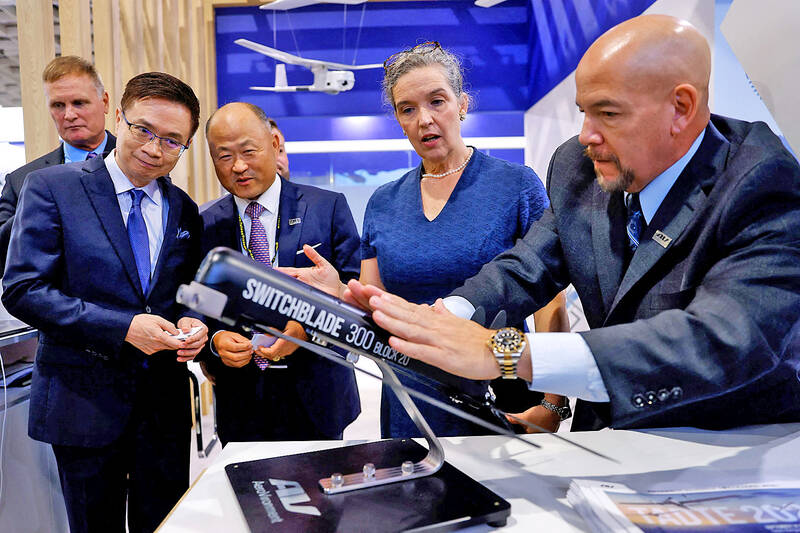The Switchblade 300 loitering munitions and ALTIUS 600M-V uncrewed aerial vehicles that Taiwan has ordered from the US are scheduled for delivery between this year and the next, the US Department of State said on Wednesday.
The department on Tuesday notified the US Congress of its approval of the possible Foreign Military Sales of up to 720 Switchblade 300 and up to 291 ALTIUS 600M-V to Taiwan.
The drones, estimated at a cost of US$300 million, would represent the 15th arms sale package to Taiwan under US President Joe Biden’s administration.

Photo: Ann Wang, Reuters
Asked about the sales, the US Bureau of Political-Military Affairs said in a written response on Wednesday that “both sales are for delivery in 2024-2025,” but it did not specify whether the full supply of 1,011 weapons systems would be delivered within that time frame.
However, US-Taiwan Business Council president Rupert Hammond-Chambers said that he believed the delivery would be completed in the next 18 months.
“There is no industrial base issue with delivery in this timeline,” he said in a written response. “That would have been a consideration for these programs.”
A loitering munition is a drone designed to loiter around an area and then attack the target when spotted.
The loitering munitions supply to Taiwan can complement the various precision missiles the nation already has and, coupled with domestically manufactured drones, would accelerate Taiwan’s efforts to create a multi-layered deterrence system, the Ministry of National Defense said.
The US’ decision to supply the drones, which have reconnaissance and immediate strike capabilities, would help Taiwan respond more quickly to enemy threats, the ministry said.

Alain Robert, known as the "French Spider-Man," praised Alex Honnold as exceptionally well-prepared after the US climber completed a free solo ascent of Taipei 101 yesterday. Robert said Honnold's ascent of the 508m-tall skyscraper in just more than one-and-a-half hours without using safety ropes or equipment was a remarkable achievement. "This is my life," he said in an interview conducted in French, adding that he liked the feeling of being "on the edge of danger." The 63-year-old Frenchman climbed Taipei 101 using ropes in December 2004, taking about four hours to reach the top. On a one-to-10 scale of difficulty, Robert said Taipei 101

Nipah virus infection is to be officially listed as a category 5 notifiable infectious disease in Taiwan in March, while clinical treatment guidelines are being formulated, the Centers for Disease Control (CDC) said yesterday. With Nipah infections being reported in other countries and considering its relatively high fatality rate, the centers on Jan. 16 announced that it would be listed as a notifiable infectious disease to bolster the nation’s systematic early warning system and increase public awareness, the CDC said. Bangladesh reported four fatal cases last year in separate districts, with three linked to raw date palm sap consumption, CDC Epidemic Intelligence

Taiwanese and US defense groups are collaborating to introduce deployable, semi-autonomous manufacturing systems for drones and components in a boost to the nation’s supply chain resilience. Taiwan’s G-Tech Optroelectronics Corp subsidiary GTOC and the US’ Aerkomm Inc on Friday announced an agreement with fellow US-based Firestorm Lab to adopt the latter’s xCell, a technology featuring 3D printers fitted in 6.1m container units. The systems enable aerial platforms and parts to be produced in high volumes from dispersed nodes capable of rapid redeployment, to minimize the risk of enemy strikes and to meet field requirements, they said. Firestorm chief technology officer Ian Muceus said

MORE FALL: An investigation into one of Xi’s key cronies, part of a broader ‘anti-corruption’ drive, indicates that he might have a deep distrust in the military, an expert said China’s latest military purge underscores systemic risks in its shift from collective leadership to sole rule under Chinese President Xi Jinping (習近平), and could disrupt its chain of command and military capabilities, a national security official said yesterday. If decisionmaking within the Chinese Communist Party has become “irrational” under one-man rule, the Taiwan Strait and the regional situation must be approached with extreme caution, given unforeseen risks, they added. The anonymous official made the remarks as China’s Central Military Commission Vice Chairman Zhang Youxia (張又俠) and Joint Staff Department Chief of Staff Liu Zhenli (劉振立) were reportedly being investigated for suspected “serious